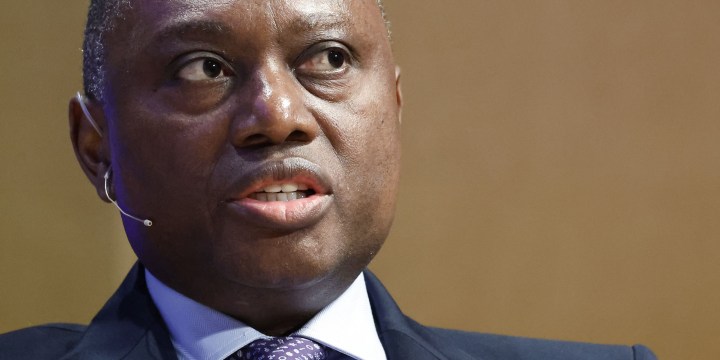COMPANY RESULTS
Rolling blackouts generate a 300% jump in Standard Bank’s fuel costs

Shareholders will, however, be pleased with the improvement of the return on equity to 16.4%, closer to the 2025 target band of 17% to 20%. The board approved a final dividend of 691 cents per share, which equates to a final dividend payout ratio of 60%.
While Standard Bank’s headline earnings for the year to end-December hit a record high of R34.2-billion, up 37%, rolling blackouts pushed the bank’s fuel costs up by 300% to R72-million.
And that was just the additional fuel impact. The group’s chief executive, Sim Tshabalala, told Business Maverick that doesn’t include the cost of disruption to the business, the cost of installing solar and generators or the economic impact on Standard Bank clients.
Shareholders will be pleased with the improvement of the return on equity to 16.4%, closer to the 2025 target band of 17% to 20%. The board approved a final dividend of 691 cents per share, which equates to a final dividend payout ratio of 60%.
“Revenues were boosted by cyclically higher interest rates. Revenue growth was well ahead of cost growth, which supported strong positive operating leverage and a decline in the cost-to-income ratio. Strong average balance sheet growth and margin expansion, primarily due to higher interest rates, supported robust net interest income growth.
“A larger client base, recovery in transactional and foreign exchange activity, as well as increased digital volumes, drove growth in net fee and commission revenue,” Tshabalala says.
Revenue growth exceeded cost growth, resulting in positive jaws of 579 basis points (where revenue rises faster than costs). Credit impairment charges increased by 22%, driven by higher corporate and sovereign-related charges, particularly related to Ghanaian sovereign exposures. On that point, Tshabalala says that to meet regulatory requirements by holding money in government bonds, Standard Bank holds roughly R2.6-billion of sovereign debt.
“However, the provision on our balance sheet is roughly such that we’re covered to the extent of 50 to 56% of our exposure. So, in other words, we’ve put money aside to protect ourselves against the failure to repay the amounts that you put under those instruments.
Visit Daily Maverick’s home page for more news, analysis and investigations
“In the long term, we think Ghana will normalise. So we committed to that environment; we committed to providing capital to our business when it needs it. And we are working with the Ghanaian authorities to bring normality to that situation,” he says.
Liberty, which is now part of Standard Bank, saw its operational performance bounce back from a net loss in the 2021 financial year to a profit of R2.1-billion. In South Africa, the bank saw a 26% jump in headline earnings while revenue grew by 12% driven by balance sheet growth, margin expansion and a recovery in client activity to pre-Covid-19 levels.
“Credit impairment charges increased by 10%, reflective of the difficult economic environment and deteriorating client trends. South Africa contributed 47% to the group headline earnings for the year.”
Tshabalala says although those in the lower income category, earning less than R10,000 a month are definitely taking financial strain, the bank’s book of clients earning R40,000 and more a month is robust.
“There are no signs of strain there at all. Consumers generally have deleveraged as a consequence of Covid, so we are seeing better household debt-to-income ratios than during the last credit cycle.”
He cautions that going forward, continued load shedding is likely to have a knock-on effect on small to medium enterprises and jobs, increasing strain on consumers.
The bank expects interest rates to increase by an additional 25 basis points in the first half of this year, (in addition to the 25 basis points increase in January 2023), followed by a pause. Inflation is expected to moderate to 5.9% in the year ahead. The economy is expected to grow at 1.2%, held back by severe electricity shortages and structural constraints. The level of electricity disruptions experienced year to date is unprecedented.
“As a group, we have both the capital and appetite to support our clients’ growth. However, our balance sheet growth will remain subject to the economic growth, policy and enabling frameworks in the countries in which we operate, and in turn our clients’ confidence to invest.
“In South Africa, meaningful structural reform and an improvement in the electricity supply could lift confidence and accelerate economic growth, job creation and social upliftment,” he concluded.
The share price moved up 12% over the last year, closing at R179.82 on Thursday night. DM/BM



















Comments - Please login in order to comment.